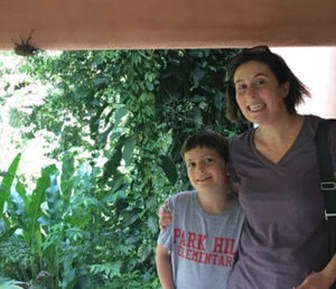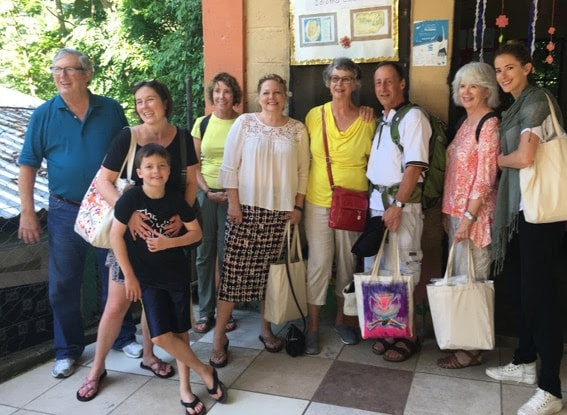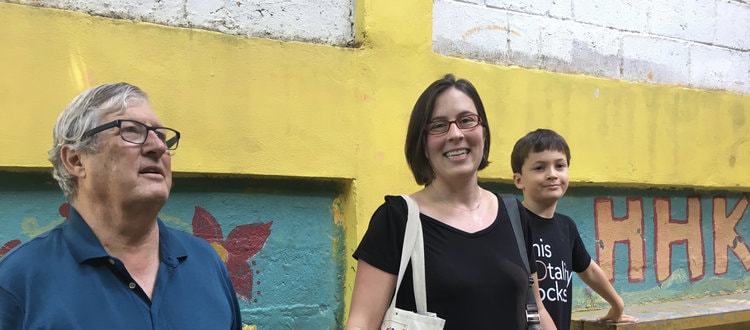|
by Lindsey Hayes Our family, family friends, and members of the Denver Cherry Creek Rotary Club gathered in front of the Jungle School Kindergarten Classroom. Even before touching ground, we saw the beauty of the sea. Colors sparkled from deep blue to translucent green, jungle-covered mountains rose behind the ocean and the sun shone (despite Hurricane Nate threatening the days before). Our trip had begun! After passing customs in the San Pedro Sula airport, where we handed over hastily completed forms never quite understood, we loaded bags full of glue and glitter, deemed safe by the TSA, into a rented van and our three-hour journey began. We drove through a toll booth with an option to pay or not, past bikes and pedestrians, and through the town of El Progreso. Jesus (our driver and soon to be translator, tour guide, and friend) played "Take My Breath Away" by a cover band and maneuvered the road. After one instance of the two lanes accommodating four vehicles, we accepted that we were in his hands and acquiesced to the broken seat belts and missing head rests. "Welcome to Honduras!" Three generations together in Honduras. Our first meal was at a gas station/restaurant. Buffet-style, we ordered pollo y papas fritas, botelas de agua, y coke sin calorias. We were delightfully full and ready to get back on the road, past more small houses, beautiful vistas, locals wading in rivers, small towns with speed bumps, and sun shining on poverty. We drove through La Ceiba and up La Quanca to Hotel Rio where we were greeted by the employees who live onsite. After coordinating rooms using our muddled Spanish (as none of us but Dick spoke the language) we settled in. The apartment house had already become home to Cynthia and Kate, and as Evan plopped into the hammock to read his latest book, Pepe, the gracious owner of this beautiful hotel by the river, shared stories of Honduras and Colorado and adventure. We gathered for a homemade meal in the restaurant and enjoyed the local beer Salva Vida, fresh pineapple as sweet as candy, and conversation. The sun had long set and the jungle was coming alive, so we retreated to our rooms, with fans blowing and excitement for the next day upon us.  We entered the Jungle School with only basic knowledge of the school's history and purpose. The barbed wire and padlock at the entry gate were sobering reminders of the gangs and poverty-driven crime nearby. With our craft bags in tow, we toured the school from the (literal) bottom up. We stopped at Fourth Grade and Evan confirmed Jungle life was part of the learning! the class would enjoy the art project so we rummaged through donated craft supplies to pass out patterned paper, scissors, glue and GLITTER! Evan, Marcia and Susan led the organized chaos as students transformed construction paper into symbolic paper dolls holding hands and sparkling crowns. Dick chatted with the teachers and was called upon to translate as needed. The group divided and Cindy and Rogene went to Kindergarten, where kids enthusiastically created pictures of their family under a blue sky. Marcia brought clouds of cotton balls, glue and blue paper to Second Grade for more sky creations and Evan and Dick demonstrated for Fifth Grade while Susan and Lindsey passed out more supplies to share among todos en su clase. Cynthia and Kate led the First Grade and next door, in a calm and respectful Third Grade, Evan, Dick and Joel passed out pigamente and more glitter. In between art projects, a nurse distributed vitamins and staff members measured students for gym uniform shorts which will be sewn by mothers whose time as a volunteer is the only required tuition to attend the Jungle School. Our craft projects complete, we gathered as David, the founder of Helping Honduras Kids and the Jungle School, detailed the abject poverty and abuse suffered by the very children we had just entertained. The same kid we saw with a smile on their face, knack for engineering, or glitter artist may have walked two hours to be at school, may not eat all weekend, may have witnessed horrific crimes or murder, may have experienced abuse, and was undeniably one of 69% of Hondurans who live on less than $2.50 a day. He shared this as we sat by open flames where rotating volunteer mothers cook food for the hundreds of students. Near us, a solar heater ensured safe water and tin roof shielded students from rain. Chickens ran free and a loose dog did not faze the mothers or kids, responding to a casual "shoo!" Plans are in place to move the smoky kitchen away from the outdoor "cafeteria" and funding is needed to build a meeting area larger than the current one that doubles as a fútbol field - for a school on a hill does not allow for traditional space for kids to act like kids. And despite their hardships, the Jungle School kids are kids, and as we helped them with glue and scissors in small classrooms, surrounded by maps of Honduras, times tables, and history lessons, we were reminded of the commonality of kids all over the world. When we returned the next day to the Jungle School with cash in hand, the presentation of our gift was not the priority of the office. Helping a mom and her two young kids and reviewing paperwork in la oficina de adminitracion took precedence. After our tour from the day before of an American-owned Honduran-operated business, we knew there were complexities to receiving support from abroad. Skepticism often greets offers of aid after past experiences when promises never materialized. Once David, the liaison between our two worlds, arrived, the transaction became simple. A Denver Cherry Creek Rotary grant to purchase fabric for Physical Education uniforms and supply a year’s worth of essential notebooks for every student. We made promises of connecting with other US groups to support the Jungle School’s larger future projects and hopefully our presence demonstrated accountability toward these goals. As we walked down the stairs created from repurposed tires, a faded sign the only indication of the hundreds of lives influenced on the hill above, we hoped our short-time left a positive impact in their world, as theirs had certainly impacted our world. The number one source of income in Honduras is money sent back from the states. Local unemployment is high and skilled jobs are highly valued. We visited Oro Maya - the Honduras Chocolate Company, where locals are employed and capital investments from the United States sustain production. The chocolate factory was carved from a steep, jungle-covered hill near the Hotel Rio. Cacao trees flourish underneath the shady umbrella of the jungle. A seemingly simple cement building houses solar drying rooms, cacao grinders, and glass panels separating the jungle seed from the packaged good. Despite the remote setting, quality control and FDA compliance ensure food safety and quality. We put on hair nets and face masks, promised not to touch despite the temptation to dip a finger and lick, and toured as machines swirled, liquid formed, sugar joined and chocolate appeared. Two employees hand-wrapped Honduras Chocolate Company bars made only of sugar and 65%, 70%, 75% or 80% cacao while another vacuum sealed Oro Maya couverture, used by chocolatiers to produce specialized creations. After witnessing technical magic transform cacao pods into delicious, organic dark chocolate, we marveled at how this small facility in the middle of the jungle could produce the same product displayed in the San Pedro airport, local shops, and gas stations. As we enjoyed a dinner prepared by the lovely family of Hotel Rio (and relished chocolate for dessert), we reflected and marveled at the varied sights and experiences of our day and the beauty of the vast jungle and all it contained just a short, bumpy ride away. During a relaxed morning, our last at Hotel Rio, we sipped our café, seemingly prepared straight from the bean with smooth flavor con o sin leche and savored the pineapple, in awe of its sweet taste as much on the last bite as the very first. We appreciated the desayuno typico of plantains, beans, scrambled eggs, crema and la sandia and prepared for a "tourist day." Shall we shop? Kayak? Hike? With the enthusiasm of Jesus' suggestion, we ventured to Canopy Tours. Some put on a harness, bounced around in a truck to the top of the mountain, and for eighteen platforms, zip-lined over the jungle below con a vista del mar. Below, others jumped in fresh spring water with areas of temperatures welcomingly cool in the humid air with pockets of soothing heat. Descending the steps sprinted down by locals and youth and personally assisted for those more cautious, we discovered a private warm pool with mud baths and massage treatments. Looking like warriors slathered in red mud, our bodies feasted on the pure minerals of Honduran earth. Just as the jungle had become our familiar home – like a tropical Colorado – we parted and headed to the town of La Ceiba. Poverty that had been shielded from us by the vivid flowers and towering trees of the jungle was now seen as abject. In the first downpour after the anticipation of many, the lack of infrastructure floated to the surface. Whole families balanced on a bike, crowds of kids puddle-jumped after school, and groups of men piled in flatbeds venturing out into the flooded streets of La Ceiba. Small cars stalled as whatever drainage existed clogged the streets. Jesus skillfully maneuvered through deep water and snarled traffic in this urban third world. For a short while, only van walls distanced us from a typical day in the third largest Honduran city. When we stopped at the Buena Amiga souvenir shop and then checked into our beach hotels, we were once again separated from the realities of the city, but our guard was up in a new way. A beach view with patrolling policia and a brief electrical blackout from the evening use of air conditioners on an inferior power grid provided visual reminders of the country’s day-to-day reality. Settling into after-dinner drinks on a balcony overlooking the Caribbean, we heard waves crashing and street cats fighting, highlighting a country striving to draw tourists yet inherently challenged by its history, violence, and poverty. The Adelante Foundation has been a part of my life since my only visit to Honduras in 2005. Then, it was grassroots and groundbreaking. After seventeen years of successfully providing borrowers, mostly women, with the opportunity to start businesses and support their families, the Adelante Foundation is now sophisticated, efficient, and respected. The General Manager and Honduran staff shared with pride a tracking application created in-house to efficiently locate clients, tell stories of entrepreneurs and better manage the staff supporting them. Company-owned cars transported us to an assembly, where women borrowers meet every month to make their loan payments, review business skills, and provide support to each other. Together, their collateral is more powerful than any one tangible asset. Their collateral is unidad, disciplina, trabajo y valor as the group of borrowers enthusiastically shouted at the assembly's beginning and end, “unity, discipline, hardwork and courage - this is our way of life!" Four women shared their success stories with us and proudly displayed their products and services. A one-woman beauty shop servicing five to twelve word-of-mouth clients per day grew from an original small loan for a hairdryer. Thanks to a client’s latest loan, the Honduran crafts she sells from her porch come from the capital city Tegus via a newly purchased family-owned car, rather than the unreliable bus. We purchased a calculator and book of Honduran songs at a successful store owned by an Adelante client. The owner’s high school son was studying on the computer while she shared stories of her visa process for an anticipated future visit to the United States. (Not unlike a day in my home a few weeks ago when we anticipated this very visit abroad.) Our final stop was to a store in a home designed by the family, with graceful archways, a television and full kitchen. Still a work-in-process, using incrementally larger loans as the pulperia grew more successful, the home that was once cinder blocks and a tin roof was now approaching middle class. Her son helped in the store before turning back on the TV and her daughter changed out of her uniform first thing after school. (Something that occurs in my house every day.) Unfazed by the pools of rainwater in the street or tropical window panes lacking glass, Evan passed no judgment, only relief that the store had familiar non-spicy chips and Fruit Punch Gatorade. We piled back in the van and left the Olympia neighborhood. As the rush-hour traffic kept us on the road longer than planned, we took the opportunity to process our impressions after witnessing first-hand the results of mixing limited education with a determination to succeed and the opportunity to thrive. At the Adelante offices, we thanked the staff for an inspiring day, waited as the Development Director and our liaison between the US and Ceiba, coordinated one last adventure, and left the experience excited that we had recently provided a Denver Cherry Creek Rotary grant to an organization with proven results, through both tangible data and success stories out in the field. Our last day was bookended by stark reminders that despite his maturity and appreciation for our adventures, Evan is a nine-year old. The understandable first-world disappointment of a promised hotel water slide which never opened led to a morning of PBS television in Spanish, extra “tech time,” and promises of future stateside amusements. The day ended in tears, not of disappointment, but fear. That evening, we shared pizza with the children at the Helping Honduras Kids orphanage. Evan enjoyed distributing pizza and paper plates before joining the kids to eat. After the dinner, he decided to decompress and wait in the van with Jesus, our very trusted driver. Parked in the dark outskirts of La Ceiba, with skinny dogs wandering past the open padlocks on the orphanage gate, the scene became intimidating. Looking for us, he entered the dark building alone and could not find our group or speak the language to ask. The comforting similarities found earlier sharing a meal with kids like those at any other "pizza party" were abruptly replaced after twenty minutes away from the familiar. Kids may all be kids but all childhoods are not the same. That reminder is my significant take-away from observing life in Honduras and America. As I watched Evan prepare a school presentation about what is surprisingly the same and vastly different, I appreciated the reinforced point that whether joy from a kid’s coaxing smile, fear of an unfamiliar situation, or pride glowing from a successful business, feelings are – undoubtedly – universal. |
Archives
July 2019
Categories |



 RSS Feed
RSS Feed
